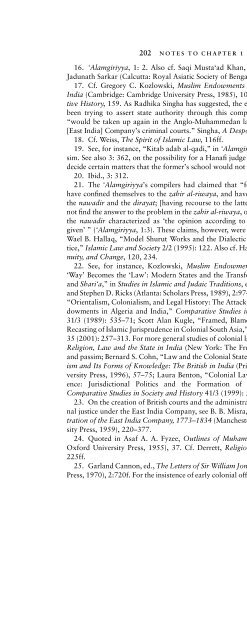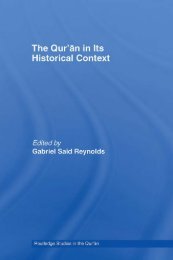Download (1 MB) - Islam and Christian-Muslim Relations: Articles ...
Download (1 MB) - Islam and Christian-Muslim Relations: Articles ...
Download (1 MB) - Islam and Christian-Muslim Relations: Articles ...
You also want an ePaper? Increase the reach of your titles
YUMPU automatically turns print PDFs into web optimized ePapers that Google loves.
202 NOTES TO CHAPTER 116. ‘Alamgiriyya, 1: 2. Also cf. Saqi Musta‘ad Khan, Maasir-i-‘Alamgiri, tr.Jadunath Sarkar (Calcutta: Royal Asiatic Society of Bengal, 1947), 315f.17. Cf. Gregory C. Kozlowski, <strong>Muslim</strong> Endowments <strong>and</strong> Society in BritishIndia (Cambridge: Cambridge University Press, 1985), 105; Bhatia, AdministrativeHistory, 159. As Radhika Singha has suggested, the emperor may also havebeen trying to assert state authority through this compilation, an effort that“would be taken up again in the Anglo-Muhammedan law as it evolved in the[East India] Company’s criminal courts.” Singha, A Despotism of Law, 16.18. Cf. Weiss, The Spirit of <strong>Islam</strong>ic Law, 116ff.19. See, for instance, “Kitab adab al-qadi,” in ‘Alamgiriyya, 3: 306–450, passim.See also 3: 362, on the possibility for a Hanafi judge to have a Shafi‘i judgedecide certain matters that the former’s school would not allow.20. Ibid., 3: 312.21. The ‘Alamgiriyya’s compilers had claimed that “for the most part, theyhave confined themselves to the zahir al-riwaya, <strong>and</strong> have only rarely turned tothe nawadir <strong>and</strong> the dirayat; [having recourse to the latter] only when they didnot find the answer to the problem in the zahir al-riwaya, or when they had foundthe nawadir characterized as ‘the opinion according to which the fatwas aregiven’ ” (‘Alamgiriyya, 1:3). These claims, however, were less than accurate. Cf.Wael B. Hallaq, “Model Shurut Works <strong>and</strong> the Dialectic of Doctrine <strong>and</strong> Practice,”<strong>Islam</strong>ic Law <strong>and</strong> Society 2/2 (1995): 122. Also cf. Hallaq, Authority, Continuity,<strong>and</strong> Change, 120, 234.22. See, for instance, Kozlowski, <strong>Muslim</strong> Endowments; idem, “When the‘Way’ Becomes the ‘Law’: Modern States <strong>and</strong> the Transformation of Halakhah<strong>and</strong> Shari‘a,” in Studies in <strong>Islam</strong>ic <strong>and</strong> Judaic Traditions, ed. William M. Brinner<strong>and</strong> Stephen D. Ricks (Atlanta: Scholars Press, 1989), 2:97–112; David S. Powers,“Orientalism, Colonialism, <strong>and</strong> Legal History: The Attackon <strong>Muslim</strong> Family Endowmentsin Algeria <strong>and</strong> India,” Comparative Studies in Society <strong>and</strong> History,31/3 (1989): 535–71; Scott Alan Kugle, “Framed, Blamed <strong>and</strong> Renamed: TheRecasting of <strong>Islam</strong>ic Jurisprudence in Colonial South Asia,” Modern Asian Studies35 (2001): 257–313. For more general studies of colonial law, see J.D.M. Derrett,Religion, Law <strong>and</strong> the State in India (New York: The Free Press, 1968), ch. 15<strong>and</strong> passim; Bernard S. Cohn, “Law <strong>and</strong> the Colonial State in India,” in Colonialism<strong>and</strong> Its Forms of Knowledge: The British in India (Princeton: Princeton UniversityPress, 1996), 57–75; Laura Benton, “Colonial Law <strong>and</strong> Cultural Difference:Jurisdictional Politics <strong>and</strong> the Formation of the Colonial State,”Comparative Studies in Society <strong>and</strong> History 41/3 (1999): 563–88.23. On the creation of British courts <strong>and</strong> the administration of civil <strong>and</strong> criminaljustice under the East India Company, see B. B. Misra, The Central Administrationof the East India Company, 1773–1834 (Manchester: Manchester UniversityPress, 1959), 220–377.24. Quoted in Asaf A. A. Fyzee, Outlines of Muhammadan Law (London:Oxford University Press, 1955), 37. Cf. Derrett, Religion, Law <strong>and</strong> the State,225ff.25. Garl<strong>and</strong> Cannon, ed., The Letters of Sir William Jones (Oxford: ClarendonPress, 1970), 2:720f. For the insistence of early colonial officials that their judicial



